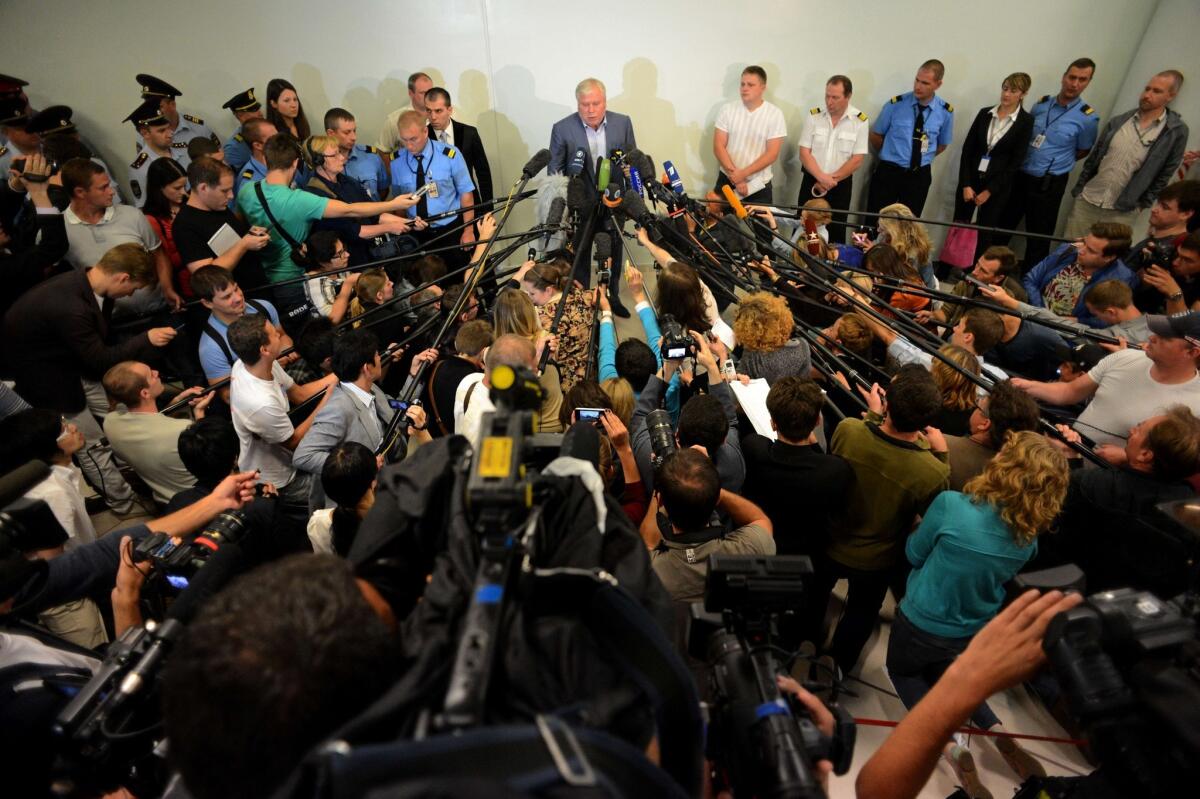U.S. officials warn Russia against giving refuge to Edward Snowden

Fugitive secrets-spiller Edward Snowden isn’t yet out of his monthlong Moscow airport limbo, but U.S. officials have warned that Russia is provoking a diplomatic crisis with its reported granting of refuge to the American charged with espionage and theft.
Snowden, who arrived at Moscow’s Sheremetyevo airport June 23 with a revoked U.S. passport, was reportedly informed Wednesday that the Federal Migration Service would provide him with documents that would allow him to finally cross into Russian territory. Because he arrived from Hong Kong with no valid travel documents, he was denied entrance by border officials and has also been unable to buy airline tickets to go elsewhere.
Russian media reported, though officials declined to confirm their reports, that Snowden would be allowed to leave the airport and stay in Russia while immigration authorities considered his July 16 request for temporary asylum in Russia. His Kremlin-allied lawyer, Anatoly Kucherena, met with Snowden on Wednesday afternoon and later said his client would have to spend another day or so at the airport because the paperwork granting him permission to enter Russia was incomplete.
White House Press Secretary Jay Carney said the Obama administration had seen the media reports that Snowden was about to be taken in by Russia and that U.S. officials were “seeking clarity” from Russian authorities.
“Our position on Mr. Snowden remains what it was, which is that he is neither a human rights activist or a dissident,” Carney told reporters aboard Air Force One. “He has been charged with serious felonies for the unauthorized leaking of highly classified information.”
Snowden should be expelled from Russia and returned to the United States, Carney said.
Sen. Robert Menendez (D-N.J.), chairman of the Senate Foreign Relations Committee, was more blunt in warning the Kremlin not to create a new conflict with Washington.
“I repeat my message to Russia that providing any refuge to Edward Snowden will be harmful to U.S.-Russia relations,” Menendez said in a statement sent to the Los Angeles Times. “Edward Snowden is a fugitive who should be prosecuted in the U.S. for the serious allegations of espionage. Snowden remains in possession of sensitive documents, and for Russia or any nation to grant him asylum or safe passage directly concerns our national security priorities.”
He said Snowden’s release of classified information “could benefit our enemies, and I call on Russia to immediately release him into the custody of the U.S. government.”
The Russian government’s reported get-out-of-airport-hell card would simply allow Snowden to wait for a decision on his asylum bid in a more comfortable locale than the cramped compartment of the transit hostel where he is believed to have been holed up since his arrival from Hong Kong.
A Russian online newspaper this week showed a picture of a typical “cubicle” at the migration transit accommodation, located between the airport arrival gates and the passport control booths manned by border guards. The room shown by gazeta.ru looked only slightly larger than a train compartment, with a single twin bed and a shower stall.
Snowden has said through his intermediaries, WikiLeaks and Guardian newspaper columnist Glenn Greenwald, that he wants to eventually move on to Latin America. At least three countries – Venezuela, Bolivia and Nicaragua – have said they would offer him asylum.
Ecuador, which has given refuge to WikiLeaks founder Julian Assange at its embassy in London, also made overtures to the fugitive American early in his now 2-month-old odyssey. But Ecuadorian President Rafael Correa appears to have reconsidered in light of U.S. warnings of grave consequences for his country’s special trade relationship with the United States, which supports hundreds of thousands of jobs and earns the country an estimated $400 million a year.
Snowden was fired by his NSA-contracted employer, Booz Allen Hamilton, after leaking details of massive data surveillance in early June to Greenwald and the Washington Post. Snowden came forward a few days later to identify himself as the source of the leaks, which he said he made because he considered the surveillance an intrusion on individual privacy rights.
He fled his Honolulu home and work venue ahead of the disclosures, initially hiding out in Hong Kong. Chinese authorities, wary of the diplomatic fallout of sheltering an American accused of treasonous behavior, allowed him to fly out of the former British colony despite his lack of a valid passport.
ALSO:
Pope Francis visits shrine to ‘Our Lady Who Appeared’
Egypt’s military chief asks public support to fight ‘terrorism’
Royal baby’s name: His Royal Highness Prince George of Cambridge
Twitter: @cjwilliamslat
carol.williams@latimes.com
More to Read
Sign up for Essential California
The most important California stories and recommendations in your inbox every morning.
You may occasionally receive promotional content from the Los Angeles Times.











